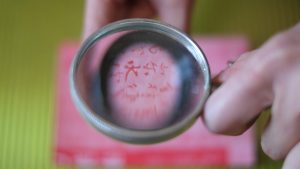CRA’P Residents April 2022
THE FIRST WORD OF THE FIRST POEM OF THE FIRST COLLECTION IS BASKET”
“The first word of the first poem of the first collection is basket” or 第一集第一詩の最初の言葉は、バスケット is a research project. We take as our starting point Man’yōshū 万葉集 the first collection of Japanese poetry, literally “Collection of the Ten Thousand [Tree] Leaves”, which contains 4,516 poems written between the fourth and eighth centuries by a variety of people: men, women, emperors, empresses, peasants, and anonymous persons. And indeed the first word of the first poem of the first book of this collection is 籠(こ)もよ (komoyo) which means basket.
For the past few months, we have been exchanging around these poems. We read them in our respective mother tongues, Japanese and French, they are an opportunity to open discussions about what we think we understand, language, translation; all in English, our language of use.
We are particularly interested in the tanka form 短歌, literally “short song”, a 31-syllable unrhymed poem cut into 5 lines like this: 5-7-5-7-7.
We are also old friends, we met while studying at PARTS, Brussels, in 2000 and are questioning our relationship to the past, what we remember or don’t remember from the last twenty two years. If we manage to find information and explanations about the context in which these old poems were written, on the other hand, we find it difficult to recompose who we were twenty years ago. Our memory seems imperfect and perforated. We doubt our own memories.
We would like this artistic research to be a learning moment as well, we hope to lay a common foundation on which to create something. We are as much interested in these distant materials as we are in how we will collaborate and invent a way of working together.
We are navigating in a deliberately blurred area between specific anchor points (Man’yoshu, translation, memory), in an unknown but common territory. Ideally we would like to continue this for several years and create public times that would be both learning and performance moments.
Kotomi Nishiwaki (Japan,1978). After her dance edcucation in P.A.R.T.S in Brussels. She has been working with Anzu Furukawa (Butoh), Abraham Hurtado, Adam Linder, Laurent Chetouanne, Meg Stuart/ Damaged Goods and others. as an actress she apears in HBO TV series “Foodie Love” 2019 by Isabel Coixet, Netflis “Bird Box” by Alex and David Pastor and other cinemas.
She created asociation Parkkeito with Miquel Casaponsa in 2017 in Barcelona. They created “Mi-Ru” 2018, at Sala Hiroshima in Barcelona and ” New (a) Days (2021) at Festival Grec @ Antic Teatre. they also creat workshop for kids in Macba and currently working for new piece “ROKATEI”.
Ondine Cloez (France, 1979) is a French choreographer and performer based in Brussels. She began with classical dance training at the Conservatoire National de Grenoble. In 1998, she moved to Brussels and studied at P.A.R.T.S. for three years. She participated in the Ex.e.r.ce training at the Centre Chorégraphique National de Montpellier, in 2002. Since then she has worked as a performer for Mathilde Monnier, Laurent Pichaud, Linda Samaraweerova, Marcos Simoes, Sara Manente, Jaime Llopis, Randy Carreno, Rémy Héritier, Antoine Defoort & Halory Goerger, Grand Magasin, Jocelyn Cottencin, Loïc Touzé… In 2009, she co-signed with Sara Manente and Michiel Reynaerts the video Some Performances and the in situ project Grand Tourists. In 2018, she created her first piece, Vacances vacance, followed by L’art de conserver la santé in 2020 and its outdoor version La Ballade des Simples. In 2020-21, Ondine Cloez is artist in residence at the Laboratoires d’Aubervilliers where she proposes various forms around her project: performances, walks and visits, conferences on health and the Middle Ages, workshops.

